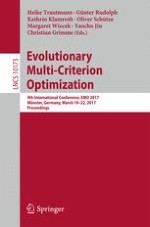2017 | OriginalPaper | Buchkapitel
A New Reduced-Length Genetic Representation for Evolutionary Multiobjective Clustering
verfasst von : Mario Garza-Fabre, Julia Handl, Joshua Knowles
Erschienen in: Evolutionary Multi-Criterion Optimization
Aktivieren Sie unsere intelligente Suche, um passende Fachinhalte oder Patente zu finden.
Wählen Sie Textabschnitte aus um mit Künstlicher Intelligenz passenden Patente zu finden. powered by
Markieren Sie Textabschnitte, um KI-gestützt weitere passende Inhalte zu finden. powered by
